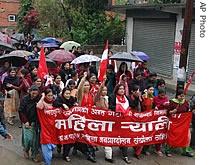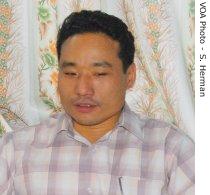2007年VOA标准英语-Nepal Struggles Along Path to Democracy(在线收听)
Kathmandu
23 April 2007
Nepal has suffered through 10 years of a violent communist insurgency, and a coup by the reigning monarch. Now, precisely one year after mass protests forced King Gyanendra to relinquish absolute power, the Himalayan kingdom is struggling to implement a form of democracy that could embrace both the former communist rebels and a monarchy. VOA Correspondent Steve Herman was in Kathmandu and brings us more on the story.
 |
| Opposition party supporters demonstrate against King Gyanendra in Kathmandu, 19 Apr 2006 |
The peace deal was indeed signed last November, elections were set for this June, Maoists rebels formed a political party and joined the interim government this month holding several cabinet positions.
But problems quickly set in. The election for a constituent assembly to draft a new constitution has been delayed - with no new date set.
The Maoists - opposing the delay - have resumed the push for their key objective: to have the monarchy abolished immediately. If it is not met, they are threatening that their political cooperation with the mainstream parties and participation in the current interim government could be cut short.
It is not a threat to be taken lightly. The United Nations Mission in Nepal - which is helping to disarm the Maoist rebels and prepare for elections - says the Maoists continue to hold influence in the countryside - where they still engage in human rights violations and intimidate the civilian population. The U.N. Mission says the Maoists are not yet in full compliance with the November peace deal.
But Maoist leaders insist they are now committed to pushing their agenda through democratic means and that will take a little time.
 |
| Nepal's Maoist central committee member Ananta |
But Nepal's democracy hinges on more than just the future of the monarchy. While the king's power grab was the catalyst that united the opposition with the Maoists, there was little that Nepal's political parties could agree upon beforehand.
This past year has already seen the king stripped of most of his authority and any future role for the monarchy - if any - is likely to be small. So attention will now turn to other issues and whether an uneasy coalition government with such diverse agendas can work.
Sociologist Krishna Bhattachan, of Tribhuvan University, argues that many Nepalese remain skeptical about the peace pact and the ability of the various parties to resolve their differences.
"It's not comprehensive peace, and the peace is in paper, not in the hearts and minds of the people," said Bhattachan. "What happened with the Maoists, is along with the arms, they gave up the core issues. Obviously there are groups who will not be satisfied as long as they don't get due rights."
The U.N. and United States say they want to see Nepal's interim leadership focus on holding together the fragile peace and organizing the country's first elections in nearly a decade.
U.S. Ambassador James Moriarty warns of the ramifications if the country cannot be held together.
"If you do see the state splinter, which could happen - if people do not listen to the demands of the various marginalized groups, or if you end up with a totalitarian state eager to export its revolution - you could destabilize a neighborhood that is hugely important for the future of the world," he said.
Critics say neither the Maoists nor the others in the political mainstream are addressing a comprehensive political agenda for the country's future. Instead, the critics say, the parties continue to bicker, in an attempt to secure power for themselves.